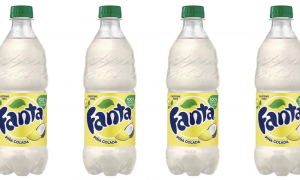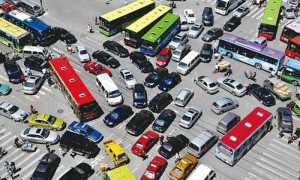The recent National Peoples’ Congress in Beijing made it clear that price stability, rather than growth, had become the top priority in China.
最近在北京召开的中国全国人大会议传递出清晰的信息:保持价格稳定(而非经济增长),已成为中国的头等大事。
The consumer price index target was set at 4 per cent (a percentage point above last year’s missed 3 per cent target). So far this year, though, the government hasn’t been any more successful than in 2010. Food prices continue to rise (though at a slower pace after the Lunar New Year banquets came to an end in mid-February). Housing prices also are going up despite measures to curb the appreciation. And the prices of commodities that China imports such as oil and coal continue to climb, up 30 per cent in the past three months.
中国将消费者价格指数(CPI)目标设定为4%——比去年3%的目标(未能实现)高出一个百分点。不过,今年迄今为止,中国在控制通胀方面做得并不比2010年更为成功。食品价格持续上涨——但在2月中旬春节结束后上涨速度有所放缓。尽管中国出台了抑制房价上涨的措施,但房价仍继续上涨。中国进口石油和煤炭等大宗商品价格持续攀升——过去3个月的涨幅为30%。
The market frets about all this. It also frets about rising wage bills in China – wages were up in nominal terms 14 per cent on the year through September, according to HSBC.
上述问题都令市场担忧。市场还担忧中国日益上涨的薪资水平——汇丰(HSBC)的数据显示,在截止去年9月的一年里,中国名义薪资水平上涨了14%。
All across China’s coastal cities, plant operators complain about their rising labour costs. China Fishery, the world’s largest fish processing firm with 14 plants across China, is no exception. Recruiting and retaining workers have become much more challenging.
在中国所有的沿海城市,工厂主们都在抱怨劳动力成本日益上升。全球最大的渔业公司、在中国各地拥有14家工厂的中渔集团(China Fishery)也不例外。招聘及留住工人的难度比以往大得多。
“We understood that this would happen,” says its group managing director, Ng Joo Siang, speaking at his Hong Kong head office, where the corridors are lined with photographs and packages of fish products. “We just did not think it would happen so quickly. Today there is job opportunity everywhere. There is much less need for migration.”
中渔集团执行董事黄裕翔(Ng Joo Siang)在其香港总部的办公室里表示:“我们知道会出现这种情况,只是没想到来得这么快。眼下到处都有工作机会,人们外出打工的必要性明显下降。”在中渔香港总部办公室的走廊两旁,摆放着海产品的图片和包装。
In response, Mr Ng says he is retooling his factories and introducing more automation to make them less labour intensive. Other manufacturers and processors are moving inland. It is no coincidence that the government is tolerating higher wages on the coast at a time when it is practical to think of moving inland, thanks to vast improvements in infrastructure. many factory owners would prefer to go to Shanxi or Sichuan than to Bangladesh and Vietnam, where often inputs have to be imported, the ports don’t work well and local customs officials may be corrupt.
黄裕翔表示,为此他正在对自己的工厂升级换代,引进更多的自动化设备,以降低劳动力密集程度。其它制造商和加工企业正迁往内地。当内地基础设施明显改善、因而将工厂迁往内地具有可行性之际,政府容忍沿海地区薪资水平上涨并非巧合。许多工厂主宁愿迁往陕西或四川,也不愿去孟加拉和越南——在这些国家,原料往往需要进口,港口经营不善,当地海关官员可能也很腐败。
Despite all this, wage inflation is one source of inflation in China that is less worrisome. Indeed, it is arguably a good thing. That’s because wage growth is part of the rebalancing that both the Chinese government and the rest of the world is calling for. That rebalancing is taking place both within China and between China and the rest of the world.
尽管存在上述种种问题,但薪资上涨作为中国的通胀来源之一,并不那么令人担忧。实际上,它可以说是一件好事。这是因为薪资增长是中国政府和世界其它国家所呼吁的经济再平衡的一部分。这种再平衡正在中国国内、以及中国和其它国家之间进行着。
As wages rise in the biggest cities on the coast, companies are moving inland, bringing jobs and wealth with them, and reducing both internal income disparities and internal capital flight. Wage hikes mean domestic demand rather than exports will become increasingly the catalyst for growth. That is good for countries that make the stuff that Chinese consumers wish to buy.
随着中国最大的一些沿海城市的薪资水平上涨,企业正将工厂迁往内地,同时带去了就业机会和财富,由此缩小了国内收入差距,并减少了国内资本的外流。薪资上涨意味着,内需(而非出口)将日益成为增长的催化剂。这有利于那些生产中国消费者所青睐的商品的国家。
That in turn spells diminishing surpluses that have led to friction with trading partners led by the US. (By contrast, Japan remains hopelessly dependent on external demand for its economic growth. Even before the natural disaster, income growth in Japan has been flat to negative for years.)
这进而意味着,导致中国与以美国为首的贸易伙伴发生摩擦的贸易顺差正逐渐消失。相比之下,日本经济增长依然无望地依赖外部需求。即使在此次天灾发生之前,日本的收入已多年没有增长、甚至出现负增长。
Just as there is good deflation and bad deflation, there can be good inflation and bad inflation. importantly, wage growth still lags behind productivity growth which means that China will remain competitive and the profits of its enterprises will continue to climb.
正如通缩有好有坏一样,通胀亦是如此。重要的是,薪资增长仍落后于生产力的增长,这意味着中国将继续保持竞争力,而企业利润将继续增长。
Moreover, inflation will do for China what exchange rate appreciation might have done if China had been more willing to tolerate a rise in the value of its currency. Already China is moving up the value added chain. China’s exports of lower value added products like toys and textiles seem to be gradually peaking, while its exports of machinery and high end equipment have been expanding, as JPMorgan’s China economist Grace Ng notes.
此外,通胀将会给中国带来那种汇率升值可能产生的效果——如果中国更愿意容忍人民币升值的话。中国已经在向价值链的高端移动。正如摩根大通(JPMorgan)的中国经济学家吴向红(Grace Ng)指出的那样,中国出口的玩具和纺织品等低价值产品似乎逐渐达到峰值,而机械和高端设备的出口正不断扩大。
It was only a few years ago that the Chinese government along with policymakers outside China worried about deflation. Indeed, terms of trade continue to favour commodity producers rather than manufacturers, in large part because of the prodigious output of manufactured goods from China. In Australia, for example, 1,000 tonnes of exported coal buys 170 imported flat screen televisions compared with just 30 of them five years ago, according to JPMorgan.
仅仅数年前,中国政府和其他外部政策制定者还在担心通缩。实际上,贸易条款继续有利于大宗商品生产国、而非制造国,很大程度上是因为中国制成品的巨大产出。例如,摩根大通的数据显示,澳大利亚出口1000吨煤可以进口170台平板电视,而在5年前,出口1000吨煤只能进口30台平板电视。
Falling prices for manufactured goods though was a good thing for frantic consumers in the west, particularly in the US. Arguably, inflation in China will be worse news for the rest of the world than for China itself because the cost of imports from China will rise, importing inflation along with goods. China and other manufacturing economies in Asia have become important factors in global price setting, according to Ms Ng.
然而,制成品价格不断下降有利于西方(尤其是美国)狂热的消费者。可以说,相对于中国自身而言,中国通胀的消息对于其它国家来说更加糟糕,因为它们进口中国产品的成本将上升,在进口商品的同时输入了通胀。吴向红表示,中国和亚洲其它制造业经济体成为了全球价格形成中的重要因素。
Still, the world and China’s increasing population of ageing and retired workers must be grateful for improvements in the fortunes of China’s labour force. If China can’t get rich before it gets old, at least its people can.
此外,全世界以及中国日益增加的老年人口和退休工人,肯定会感谢中国劳动力财富的增加。如果说中国不能在步入老年之前变得富裕起来,至少它的人民可以。







